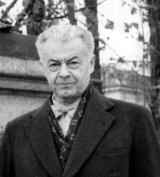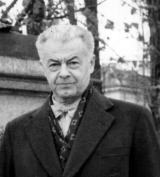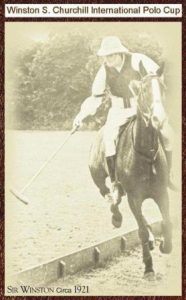Bulletin #28 - Oct 2010
Churchill and Reves

October 5, 2010
By Frank Shatz
Laurence Geller, the British-born president of the Churchill Centre in Washington, and vice-chairman of the American Friends of The Churchill Museum, asked me to write a recollection of some of my conversations with Emery Reves. “It should be about his association with Winston Churchill,” he told me, “and would be published in Chartwell Bulletin’s online edition.”
“My friendship with Emery Reves became firm and longstanding, when he realized that I admired him for his ideas about how to secure world peace, not because of his close association with Winston Churchill,” I wrote.
I recalled that during one of our extended conversations, Emery confessed that it hurt him, and he had always resented it when journalists interviewing him, or people at dinner parties, asked questions mostly about his relationship with Churchill, and just coincidentally about his seminal work, “The Anatomy of Peace.”
“Although I have always considered Churchill one of the giants of history, I resented to be seen as his appendix. I have lived in his shadow for too long,” Reves said to me.
I never did press Emery for details of his relationship with Churchill, but having been a born story-teller, during the many years of our friendship, he often volunteered to tell me about episodes involving Churchill.
At one time we were talking about how he had recruited contributors to his international newspaper syndicate, such statesmen’s as Lord Cecil, Austen Chamberlain and many others. I asked Reves, how did he manage to sign up Churchill?
With a mischievous smile, he replied: “It wasn’t because we had suddenly become soul mates. It started out as a symbiotic relationship, I needed someone with his eloquence, and Churchill, finding himself in the “political wilderness,” needed an international platform.”
After hesitating for a moment whether to say it, Reves told me: “I have learned that Churchill was in a tight financial situation. That even his butcher threatened to cut off his credit. I went to see him at Chartwell, and offered him a guaranteed fee for his articles, at twice the rate than any other newspaper paid him. He signed up.”
Reves told me that during the pre-war years, the relationship between Churchill and himself was cordial, but not really warm. Churchill repeatedly expressed his appreciation for Reves ability to disseminate the views of the democratic statesmen’s worldwide, but remained distant. “I heard that in conversations, he sometime referred to me as “my Hebrew collaborator.”
But all this changed when Reves was forced to flee Paris. He managed to get in touch with Churchill, at that time already Prime Minister of Great Britain. Churchill issued an order that Reves should be rescued. In Bordeaux a British destroyer picked him up, took him out to the sea where he was transferred to a British cargo ship and brought to England.
“Churchill put me immediately to work, to counter Nazi propaganda. But I was still a Hungarian citizen, and I told him that according to the new regulations, as an alien from a country allied with Nazi Germany, I could be put into a detention camp any day.
“Would you like to become the subject of His Majesty?,” Reves recalled Churchill asking him. “Nothing would make me happier,” was his response.
In the span of less than a week, Churchill arranged to have the British citizenship bestowed on Reves..
In early 1941, Churchill decided that Reves should go to the United States, and help orchestrate a public relations campaign on behalf of Great Britain. “He told me that what was being done is inadequate,” Reves said.
“Remembering my success countering Goebbel’s Nazi propaganda, Churchill gave me a free hand to do the same in America.” he said.
While having lunch at Chateau Madrid, not far from Village Eze, we talked about the impact his book “The Anatomy of Peace” had.
“Churchill read my book, and considered it well-written, persuasive on many levels. But he wouldn’t endorse my ideas about how to secure world peace. We had many discussions on the subject. But Churchill could not envisage a world without sovereign states. He used to say, ‘National interest will always take precedent over utopian designs.'”
Reves said that Churchill detested “smallness” in everything. Thus, he was very appreciative of “great gestures,” in hospitality, financial arrangements and credibility.
While as a guest at the Reves’ Villa La Pausa, Churchill mentioned that he intends to write a book. (I think, it was the fourth-volume of The History of the English Speaking Peoples, but I am not sure.) In any case, Reves recalled, that before a word was put on paper, he offered Churchill a large sum for the publishing rights. (I think, in foreign languages.) Churchill accepted the offer, saying: “You have never disappointed me.”
Reves, having a sardonic sense of humor, occasionally reflected on the relationship Churchill had with his wife, Wendy. “From the beginning, when Churchill first came for lunch to our house, I was worried that Wendy’s exuberance would clash with Sir Winston’s British formality. But I was wrong. They had a fabulous friendship. Churchill often told me: “Wendy has a talent to bring sunshine into and brighten up the cloudiest day.”
Although my conversations with Emery took place years after the breach between the Churchills and the Reves’s, he didn’t hold him responsible for the break-up of their friendship.
Frank Shatz lives in Williamsburg, Va. and Lake Placid. His column was reprinted with permission from The Virginia Gazette.
Subscribe
WANT MORE?
Get the Churchill Bulletin delivered to your inbox once a month.






